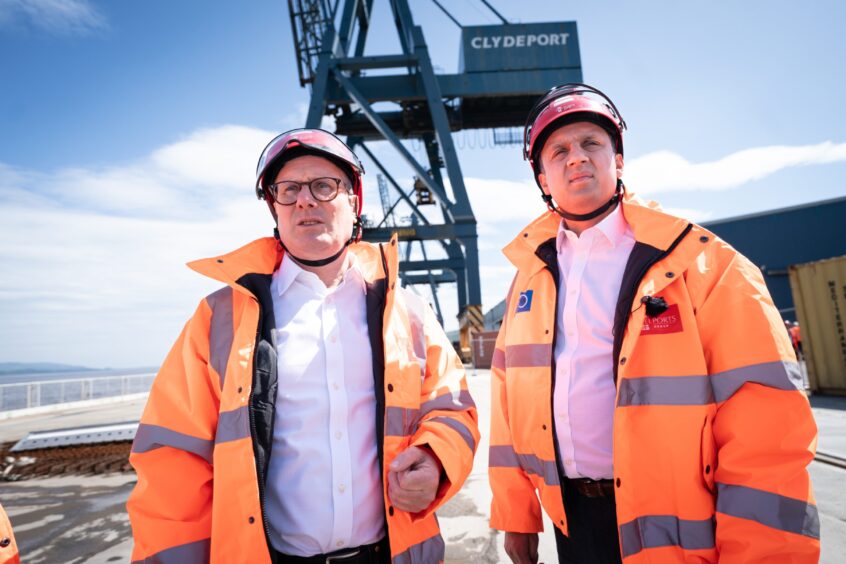The Labour Party has achieved a landslide victory in the UK general election, however, as it forms the next government clarity is needed on GB Energy.
Labour has proposed a number of policies relating to the UK’s energy market in the build-up to polling day with a publicly owned energy firm being high up the list of priorities.
GB Energy could be a great idea, if people know what it is actually setting out to do.
Scottish Labour leader Anas Sarwar described it as a “publicly owned energy generation company” while the incoming prime minister Kier Starmer said it would be an “investment vehicle, not an energy company“.
The Labour Party also suggested it would not be an energy retail company and that it would “generate power in its own right, as well as owning, managing and operating clean power projects alongside private firms”.
GB Energy: ‘I might get excited when I find out what it is’
With this confusion, Energy Voice senior reporter Erikka Askeland and print features lead Ryan Duff discuss what a publicly owned energy company could look like in the UK.
Ms Askeland said: “I’m still kind of uncertain because one of the things they say is that it will be clean power, so no oil and gas licences, and help households save £93 billion. What kind of calculation is that, I’m not quite sure.”
She explained that the initiative is part of a “big green energy plan” that Labour “apparently” has.
That being said, she still said the policy was a “massive reversal” on the previous policy Labour shared that detailed £28 billion of investment per annum in the UK energy sector.
Ms Askeland argued that policy “would have almost have been the same kind of effort and investment that we see in the US.”
Speaking on his feelings towards GB Energy, Mr Duff added that he “might get excited when I find out what it is.”
“Despite this being a landslide victory for Labour, at the end of the day it was more the Tory’s loss, isn’t it?
“I was speaking to some folks at an industry event quite recently and my general consensus was, I was scrolling through TikTok, looking at Labour’s account there and a lot of the posts
were just sharing what Rishi Sunak was doing and going ‘well, we’re not him’ and I think that was their stance almost.
“I think that was a serious way to forge ahead because you didn’t need to provide details on the nitty-gritty of how we’re going to make things work.”
Dan McGrail, chief executive of trade body RenewableUK, explained that there are a number of actions Keir Starmer will have to take in order to reach his goals of green energy roll out.
He said: “Most notably, lifting the effective ban on onshore wind in England and increasing the budget for this year’s Contracts for Difference auction to enable new wind, solar and tidal clean energy projects to go ahead.
“By increasing the budget as one of its first key actions in office, the new government can make a crucial intervention to unlock billions of pounds of investment in renewable energy projects, lowering bills for consumers, enhancing our energy security, and boosting UK supply chains and high-quality jobs across the country.”
‘Very real concerns’ still raised around ‘some aspects of Labour’s energy policy’
GB Energy is not the only policy laid out by Labour that will impact the UK’s industry.
The party has also detailed changes to the energy profits levy (EPL) and the future of licencing in the North Sea.
Labour said it will not revoke existing North Sea licences and will work with operators to “manage our existing fields for the entirety of their lifespan”.
The party’s manifesto outlined that it would not issue exploration licences for “new fields”, but the party said it will manage North Sea production “in a way that does not jeopardise jobs”.
Issuing new licences “will not take a penny off bills, cannot make us energy secure, and will only accelerate the worsening climate crisis”, Labour said.
Following the election result, Russell Borthwick, chief executive of Aberdeen and Grampian Chamber of Commerce (AGCC), told Energy Voice: “We need the PM to deliver on his commitment to forge a new partnership with business to boost growth and to work with his government to ensure that Aberdeen and Grampian is in pole position to deliver an energy transition that secures investment, jobs and creates the opportunities everyone covets in the clean industries of the future.
“However, very real concerns – shared by industry, investors, academia and the trade unions – persist around some aspects of Labour’s energy policy.
“That policy must be one that actually avoids a cliff-edge rather than just saying it, while we scale up opportunities, projects and jobs in renewables. We need policies that prevent a premature shutdown of the North Sea. Ones that don’t ‘offshore’ more oil and gas production with a significantly higher global carbon footprint while we still require fossil fuels as part of our energy mix. And that ensure we do not suffer wholesale flight of investment and people to overseas markets.
“The world class energy eco system in the North-east of Scotland should be viewed by the new government as the solution and not the problem to our challenges and our offer to Keir Starmer is to work together with them on this.”
North-east of Scotland to reach out to new government
The chamber boss explained that he will be writing to the new prime minister next week on behalf of his organisation’s members.
He said he will be asking Keir Starmer’s government to provide “much needed economic stability that will create the conditions for business to thrive in every part of the UK.”
Mr Borthwick added that “selfishly” his letter will focus “on supporting our members and the wider North-east community.”
Protecting jobs has been a theme among industry reaction as Labour’s supporters even raise concern around the risk of losing the UK’s skilled workers.
“Obviously we are delighted with a new Labour government, but we need to keep up the pressure on Labour to ensure any Labour policies protect offshore workers jobs,” wrote John Boland, regional officer for Unite the Union.
Recommended for you

 © Stefan Rousseau/PA Wire
© Stefan Rousseau/PA Wire © Supplied by Renewable UK
© Supplied by Renewable UK © Supplied by Michal Wachucik
© Supplied by Michal Wachucik